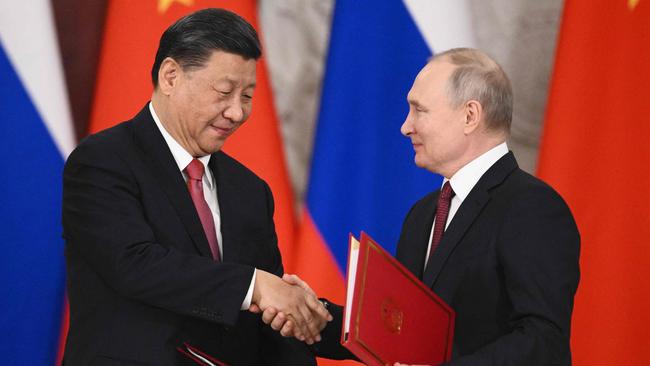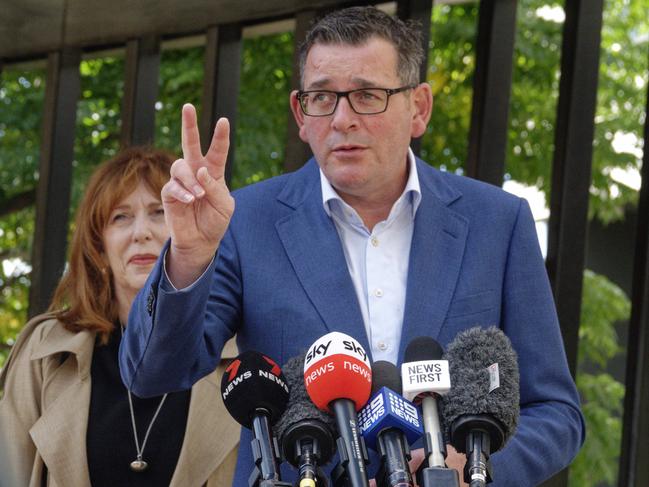
But over dinner and in social conversations he almost certainly discovered how Australia and Victoria are becoming part of a Chinese energy strategy that goes way beyond the implications of latest OPEC production cuts into China’s plan to dislodge the US dollar as the world currency and lessen the ties between Japan, US and Australia.
China must watch in amazement and admiration at how Daniel Andrews brilliantly bamboozles not only federal and state Liberal opposition leaders, but those in the ALP government in Canberra.
Accordingly, he has become a small but important cog in the unfolding global energy saga.
We start this chapter of the saga on the eve of last month’s visit to Russia by Chinese President Xi Jinping.
Xi instructed China’s Ministry of Natural Resources to issue new map regulations that replace the current Russian names of eight places near the Russian-Chinese border.
The name of the Russian Pacific Ocean city of Vladivostok was changed to Hai Shen Wai – its name before Russia annexed the city and surrounding areas around 1860 under threat to set Beijing ablaze.
Xi’s long-term aim is regaining that annexed territory from Russia and to link Hai Shen Wai to Europe via a fast rail passing through Ukraine.
But Russian President Vladimir Putin played his own card prior to the meeting and boldly announced that the massive pipeline project to pump gas from Western Siberia to China via the annexed territories acquired in 1860 was ready to be signed off.
Putin believed it would be “the deal of the century”.
Xi declined to sign anything, so no mention of the gas project was included in the official statements.
In the final joint communique, a disappointed Putin commented that more work “still had to be done”.

For China, an essential part of the Xi-Putin deal was the ability of China to buy Russian oil and gas through existing channels at a discounted price – a concession now made more valuable by the OPEC cuts.
But even more importantly, that price would be set in Chinese currency and not US dollars.
This was a significant step to reduce the hold of the US dollar as the world currency, and therefore lower the American standard of living, which benefits from the US dollar’s world currency status.
Matthew Henderson, writing in London’s Daily Telegraph, goes further and says we should read Xi’s “oracular and ominous” parting words to Putin forecasting “changes coming, such as haven’t been seen for a century”, which “we can push forward together”.
China watchers have been poring over these words for every last nuance, but it seems clear that Xi was framing himself as effective leader of the two nations with Putin nominally by his side.
This will not include sharing power with “a chaotic Russian kleptocracy”, Henderson says.
Russia’s mess in Ukraine gives Xi the chance to make Russia a vassal state of China, including effective control over the eastern areas of Russia that Russia annexed.
Right now, China and India are enjoying low-priced gas and oil from Russia, which means that the people of Russia are not getting full value for their resources and what they do receive is being squandered on the Ukraine war.
For Xi, this looks to be a “once in a century” opportunity, albeit longer term.
But right now both China and Japan need Australian gas, and an important source of that gas is the Queensland fields.
The Australian Energy Operator, backed by the CSIRO, has told national cabinet that given the planned increased Australia power demand there will be blackouts in NSW and Victoria without gas.
The crisis was averted in 2023, but will come again.
The Chinese will have visited the Victorian government websites and know that one of the best gas reserve estimators in the world, Sproule/MHA group, has shown how rich Victoria is in onshore deep gas that does not require fracking.
The US Sproule group is well respected in China, having performed more than 50 projects, including energy reserves evaluation.
In Chinese eyes, Andrews must seem a remarkable Australian politician because he is able to deny the existence of the Sproule estimated gas by spending $42m on a committee to determine whether Victoria has onshore gas but forbidding that committee to look where Sproule has estimated the reserves.
As happens in the Chinese government system, Australian opposition politicians and local journalists would never dare question the great man.
It is at least possible that someone in China had the courage to tactfully suggest to the Victorian premier that it would not unreasonable if he developed Victoria’s own low-cost gas rather than try to take gas away from China and Japan
Of course, longer term, China can go to Russia for more gas.
The Japanese have tougher options.
Japan gets more of their Australian gas from WA and the Northern Territory and are alarmed at the effective carbon tax the federal government has placed on exports from new fields, plus the Andrew's plan of reserving big chunks of Queensland gas for Victoria that are currently contracted to China and Japan.
China was jubilant when for the first time since 1940 the Japanese were blunt in their concern that a Pacific nation – Australia – is moving towards withholding vital raw materials from Japan.
In 1940 an American embargo was placed on exports of oil to Japan as a result of Japanese aggression in China and elsewhere, which contributed to Japanese forces taking Indonesia to gain oil.
China knows that if Daniel Andrews and Canberra’s Chris Bowen hold back gas then Japan could be forced into seeking energy from China, perhaps via the future pipeline from Russia. And that gas will be priced in Chinese currency, not US dollars.
The current close links between the US, Australia and Japan might just be fractured.
Welcome to China, Mr Andrews.








Victorian Premier Daniel Andrews went to China for infrastructure capital, tourists and students.